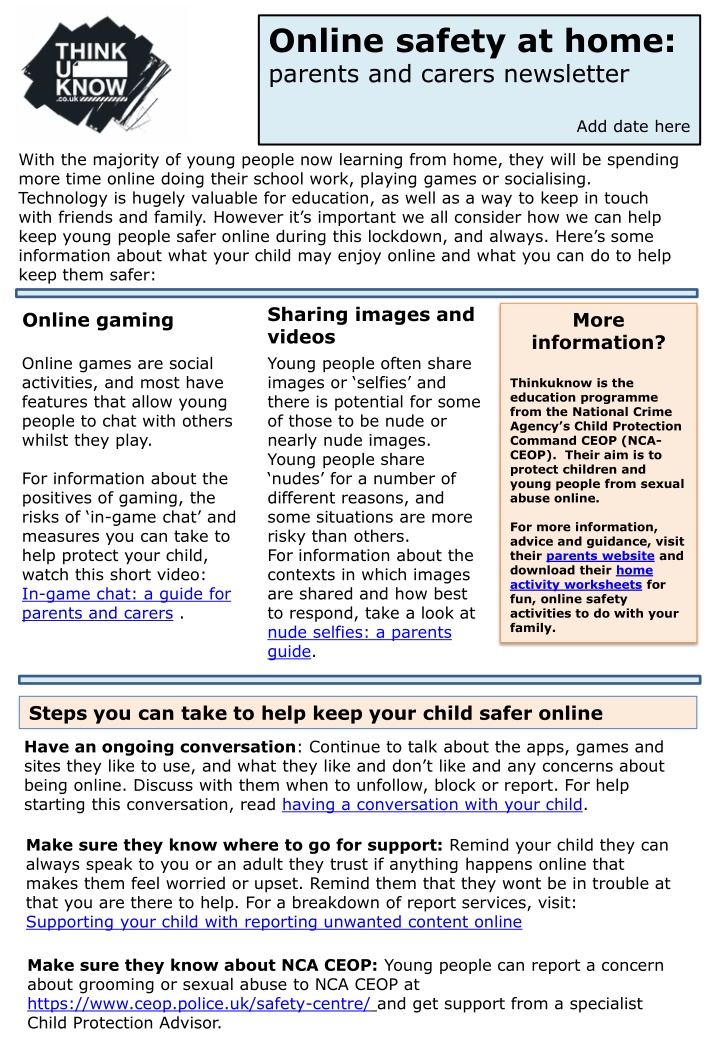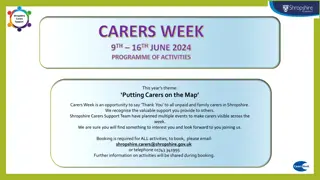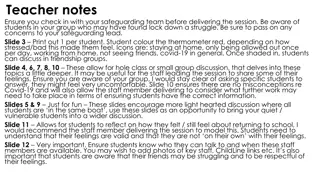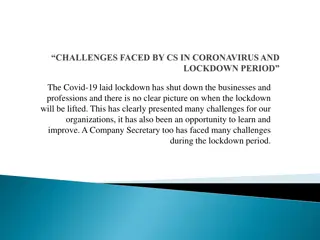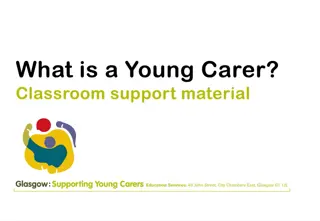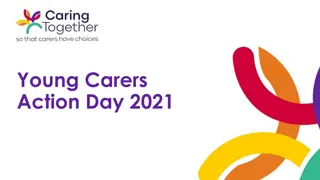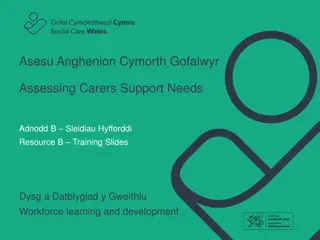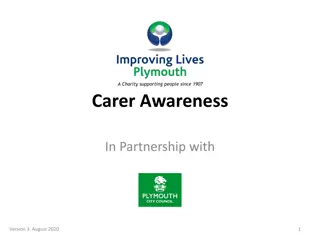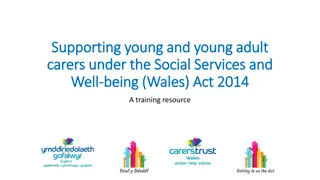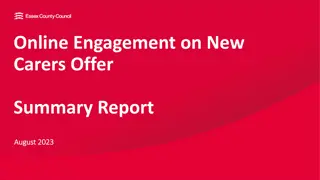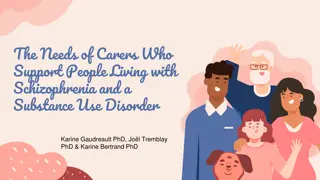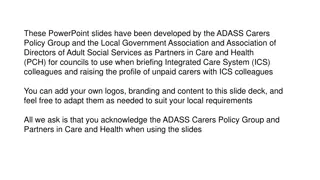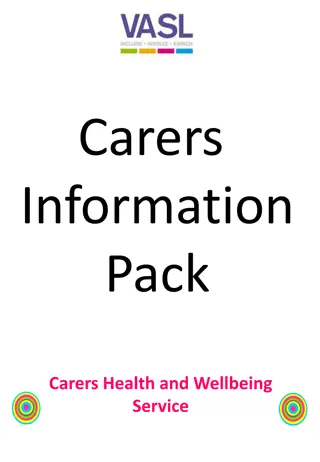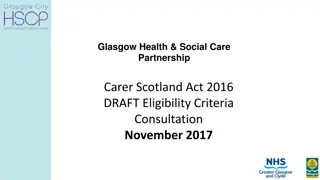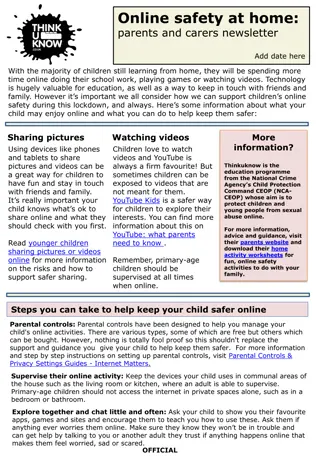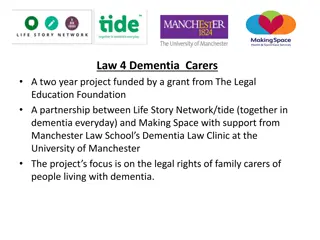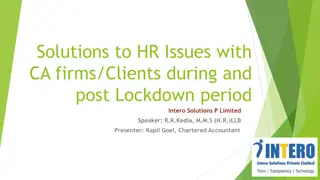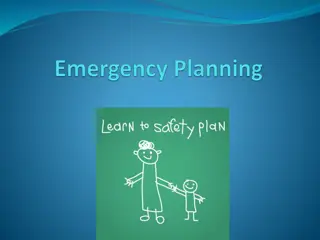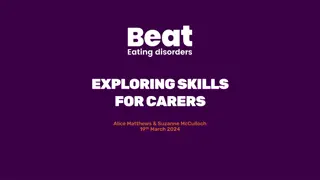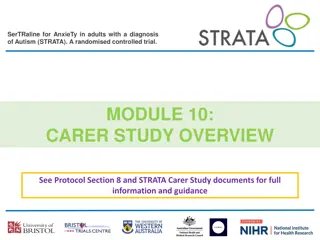Online Safety at Home: Tips for Parents and Carers during Lockdown
Young people are spending more time online for school, gaming, and socializing during the lockdown. It's crucial for parents and carers to understand the risks and take steps to enhance online safety. This newsletter provides guidance on sharing images, online gaming, social media use, and steps to keep children safe online. Resources from organizations like Thinkuknow and NCA-CEOP are highlighted to assist in fostering a safe online environment for children.
Download Presentation

Please find below an Image/Link to download the presentation.
The content on the website is provided AS IS for your information and personal use only. It may not be sold, licensed, or shared on other websites without obtaining consent from the author.If you encounter any issues during the download, it is possible that the publisher has removed the file from their server.
You are allowed to download the files provided on this website for personal or commercial use, subject to the condition that they are used lawfully. All files are the property of their respective owners.
The content on the website is provided AS IS for your information and personal use only. It may not be sold, licensed, or shared on other websites without obtaining consent from the author.
E N D
Presentation Transcript
Online safety at home: parents and carers newsletter Add date here With the majority of young people now learning from home, they will be spending more time online doing their school work, playing games or socialising. Technology is hugely valuable for education, as well as a way to keep in touch with friends and family. However it s important we all consider how we can help keep young people safer online during this lockdown, and always. Here s some information about what your child may enjoy online and what you can do to help keep them safer: Sharing images and videos Young people often share images or selfies and there is potential for some of those to be nude or nearly nude images. Young people share nudes for a number of different reasons, and some situations are more risky than others. For information about the contexts in which images are shared and how best to respond, take a look at nude selfies: a parents guide. More Online gaming information? Online games are social activities, and most have features that allow young people to chat with others whilst they play. Thinkuknow is the education programme from the National Crime Agency s Child Protection Command CEOP (NCA- CEOP). Their aim is to protect children and young people from sexual abuse online. For information about the positives of gaming, the risks of in-game chat and measures you can take to help protect your child, watch this short video: In-game chat: a guide for parents and carers . For more information, advice and guidance, visit their parents website and download their home activity worksheets for fun, online safety activities to do with your family. Steps you can take to help keep your child safer online Have an ongoing conversation: Continue to talk about the apps, games and sites they like to use, and what they like and don t like and any concerns about being online. Discuss with them when to unfollow, block or report. For help starting this conversation, read having a conversation with your child. Make sure they know where to go for support: Remind your child they can always speak to you or an adult they trust if anything happens online that makes them feel worried or upset. Remind them that they wont be in trouble at that you are there to help. For a breakdown of report services, visit: Supporting your child with reporting unwanted content online Make sure they know about NCA CEOP: Young people can report a concern about grooming or sexual abuse to NCA CEOP at https://www.ceop.police.uk/safety-centre/ and get support from a specialist Child Protection Advisor.
Topics (to copy and paste into the newsletter template) Social media Social media can offer young people opportunities to express themselves and have fun, but they could be exposed to harmful content which might include sexual images or videos which could impact on their understanding of sex and relationships. Most young people have positive experiences socialising online, but it can be easy for young people to share things or post things they wish they hadn t. You may be wondering when is the best age to let your child have a social media account, or have some concerns if they re already using them. For advice and guidance, read Is your child ready for social media? The simplest way to have information about your child removed from a website, or app is to contact the site itself. Read reporting to social media sites for more information. Remember, most social media services require users to be at least 13 years of age before they can register. For information, read Teens and the sexual content on social media. Online gaming Gaming is popular with both children and adults and can help to cure that lockdown boredom! If your child is gaming, you may have some questions about how to keep them safer. If so, check out - gaming: what parents need to know. The PEGI (Pan European Game Information) rating system can be a useful tool to help you decide what online games are appropriate for your child. Online games are social activities, and most have features that allow young people to chat with others whilst they play. For information about the positives of gaming, the risks of in-game chat and measures you can take to help protect them, watch this short video: In-game chat: a guide for parents and carers . For more information on the PEGI system and other factors to consider before deciding what s suitable, read Gaming: what's appropriate for your child For a guide on the apps, sites and games your child might enjoy, visit: Net Aware.
Topics (to copy and paste into the newsletter template) Sharing information, images and videos Young people often share images or selfies and there is potential for some of those to be nude or nearly nude images. Young people share nudes for a number of different reasons, and some situations are more risky than others. For information about the contexts in which images are shared and how best to respond, take a look at nude selfies: a parents guide. Some of the most popular apps, sites and games are designed to make it easy to share information online. But once information is shared, you can never be sure who has seen it, saved it or shared it. If your child enjoys being online and uses social media apps, games and more, it s important you know how to protect their personal information and support them to make safe choices about what they share online. If your child has shared something online they wish they hadn t don t panic. Read my child has shared too much online for advice on how to support your child. Read this parents guide to personal information and how to protect it for more information to support your child. Livestreaming Live streaming is now a very popular feature of many apps and platforms, and all you need to livestream is an internet enabled device like a laptop or a smart phone. If your child enjoys livestreaming, you may want to read what is livestreaming to find out more about it and help your child have a positive online experience. Over the past few months, many of you may have watched a livestream, or taken part in a video chat. Livestreaming can be a fun and enjoyable online activity for young people. If you want to know more about livestreaming, the risks and safe use, watch this short video: video or download this handy guide.
Steps you can take to help keep your child safer online (to copy and paste into the newsletter template) Parental controls: Parental controls have been designed to help you manage your child's online activities. There are various types, some of which are free but others which can be bought. However, nothing is totally fool proof so they shouldn't replace the need for you to support and advise your child using the internet. For more information and step by step instructions on setting up parental controls, visit Parental Controls & Privacy Settings Guides - Internet Matters. Have an ongoing conversation: Continue to talk about the apps, games and sites they like to use, and what they like and don t like and any concerns about being online. Discuss with them when to unfollow, block or report. For help starting this conversation, read having a conversation with your child. Be non-judgemental: Explain that you would never blame them for anything that might happen online, and you will always give them calm, loving support. Make sure they know where to go for support: Remind your child they can always speak to you or an adult they trust if anything happens online that makes them feel worried or upset. For a breakdown of report services, visit: Supporting your child with reporting unwanted content online Make sure they know about NCA CEOP: Young people can report a concern about grooming or sexual abuse to NCA CEOP at https://www.ceop.police.uk/safety-centre/ and get support from a specialist Child Protection Advisor. Talk about how their online actions can affect others: If your child is engaging with peers online, remind them to consider how someone else might feel before they post or share something. If they are considering sharing a photo/video of somebody else, they should always ask permission first. Tell them about Thinkuknow: Our websites provide open and honest guidance for young people on friends, relationships and the internet, covering topics like dealing with pressure; consent; and getting support when you re worried. Visit our website for 11-13's or our website for 14+ for age appropriate information. Direct your child to age appropriate information about relationships and sex: It s natural for young people to start exploring their sexual feelings online and adolescents are more inclined to take risks. It s important to understand this and to talk to your child in a positive, encouraging and safe way. Thinkuknow, Brook , The Mix and Childline all provide age appropriate information about relationships and sex that you can signpost your child to.
